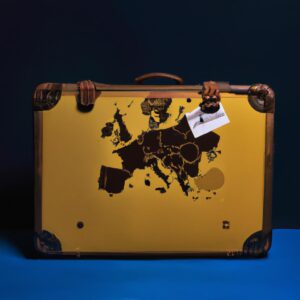
Introduction – Understanding Cultural Etiquette in European Countries
Whether you are a seasoned traveler or taking your first steps in exploring Europe, it is important to understand local customs in order to avoid any embarrassing or even dangerous cultural faux pas. Every country in Europe has its own unique culture, so getting familiar with their etiquette and customs will prepare visitors for a safe and comfortable journey.
Here is an overview of key cultural etiquette tips that should be followed when traveling to each of the countries in Europe. By keeping these in mind during your travels, you will be sure to have a positive and respectful experience.
Overview of European Cultures
Europe is the birthplace of many different cultures and languages, each distinct in their values and customs. Across Europe, people share commonalities such as hospitality, respect for religious beliefs, and a love for fine cuisine. However, there are plenty of cultural nuances that vary from country to country. For example, people from northern Europe tend to be more reserved and formal than those from southern Europe, who are typically louder and more animated. In some areas of Europe, such as the United Kingdom, shaking hands when meeting someone is customary while in other countries, like France and Spain, a kiss on each cheek is the preferred way to greet someone.
It is important to learn regional customs before traveling to ensure that visitors make a favorable impression with the local people. Dress codes in certain places are often formal, so dressing appropriately is necessary. Additionally, cultural taboos such as pointing with your index finger or entering a home with shoes on should be avoided. Moreover, it is wise to familiarize oneself with local manners and courtesies when dining out, interacting with business associates or meeting new people.
Preparing for Travel: Key Tips
When it comes to travelling to European countries, it is important to understand the cultural etiquette before your trip. Preparation is key to making sure you don’t offend anyone while visiting. Here are some tips for preparing ahead of time for regional and cultural etiquette.
- Do research on the different cultures in Europe. Learn about the specific customs, behaviors and cultural norms that are unique to the region you are visiting.
- Try to immerse yourself in the language and ensure you know enough basics to get by. This will help you to converse with those living in the country or region.
- Understand the behavior and mannerisms that will be expected from you. Familiarize yourself with the customs of greeting people, eating, conversations, and shopping.
- Book guided tours or hire a guide to visit religious places. Most places will have strict rules about clothing and behavior which you need to follow.
- Find out as much as you can about the local currency and tipping customs, so you can budget accordingly.
By doing your research and preparing accordingly for your trip, you can ensure you show respect for the culture and customs of any European country that you visit.
Customs for Greeting People
Manners matter! Greeting people in different cultures can be tricky, especially when you don’t know the local customs. Luckily, there are some general customs that are prevalent throughout Europe which you should familiarise yourself with before your travels.
The most common custom for greeting someone is shaking hands. In more formal settings, such as at a business meeting, a handshake will usually be accompanied by direct eye contact and a “good morning” or “good evening”. In less formal settings it is common to give a nod of the head and briefly make eye contact. It is important to note that some countries, such as the UK, have more relaxed handshaking customs.
In other countries such as Italy a hug and two kisses on the cheeks is more common. This is something to bear in mind when traveling in other European countries. Another popular gesture is bowing. This is commonly seen in Japan but is also practiced in some countries in Europe, particularly in the UK and Germany. A slight nod of the head or even the whole body can be enough to show respect.
Dining Etiquette by Country
When traveling to different countries in Europe, it is important to observe the local dining etiquette. Knowing how to act when seated at a table can help ensure that you respect the customs of your hosts. Each country has its own unique dining etiquette, so it pays to do your research ahead of time.
In many European countries, such as France and Italy, it is customary to wait to be seated. Additionally, it is polite to wait for the host or hostess to start eating before beginning yourself. Many cultures also treat bread as a staple of meals, and there are subtle differences in how it should be eaten – such as not buttering the entire slice all at once, rather breaking it into smaller pieces.
When eating in a restaurant, it is often expected that the check or bill will be paid for by the individual who invited you. In some countries like Russia, it is considered rude to split the bill, while in countries like Germany splitting the bill is quite common.
It is also important to pay attention to the way you use utensils when dining. In many countries, it is polite to never leave your fork and knife crossed on the plate, as this is considered bad luck. Furthermore, in places like Greece, Spain, and Portugal, the common practice is to eat with a fork and knife while leaving the spoon in the bowl when finished.
Overall, following the dining etiquette of each country is essential to ensure that you show respect and appreciation for your hosts. Doing your research ahead of time can save you from unintentionally offending someone.
Conversation Taboos
Being aware of cultural taboos is important when traveling to any country. It is especially important when traveling to Europe, as there are many countries with different customs and beliefs. Being mindful of conversation topics in these countries can help visitors to show the right level of respect and ensure they get the most out of their experience.
In some European countries, certain topics are seen as offensive to discuss in public and can be considered inappropriate. When meeting people for the first time, avoid talking about politics, money, or religion. In some places it is considered impolite to talk about yourself, even if the other person seems interested. Instead, focus on discussing the other person and topics that are mutually relevant.
In addition, there are some conversation etiquette practices that vary from region to region. For instance, in France it is not common to ask personal questions or to comment on a stranger’s appearance. However, in Spain it is perfectly acceptable to do so. It’s important to note that these variations may also come down to individuals, so getting to know someone before asking personal questions is the best approach.
By showing respect to local customs, travelers can make sure they don’t offend anyone with their conversations. While in public, it is also important to use respectable language. Always be conscious of your language and how it could be interpreted.
It is also wise to familiarize yourself with the slang used in the country you are visiting. Not only will this help you to understand the people around you better, but it will also give you an immense sense of pride for picking up on some local phrases.
Respectful Behaviors in Different Places
Religious places, such as churches and monuments, are important to remember when traveling to different European countries. It is essential to understand the appropriate behavior expected at these sites, as they should be treated with reverence and respect.
When visiting churches, it is important to dress appropriately. This typically means no shorts or tank tops, and women should ensure that their shoulders and legs are covered. It may also be expected that visitors remove their hats before entering these buildings. Additionally, visitors should stay quiet, maintain a low voice, and avoid disruptive activities such as running or playing.
It is also important to avoid taking photographs inside the religious buildings, unless specifically permitted. Visitors should also remember to refrain from eating or drinking inside the buildings and should not touch or lean on the walls.
At religious monuments, visitors should show respect by avoiding littering, standing in the wrong areas of the monument, climbing on the monument, playing loud music, or otherwise being disrespectful.
Finally, visitors should avoid participating in any offensive behavior or gestures, even if they are accepted in their own culture. This will help ensure that visitors are respectful of the culture and customs in different European countries.
Business Etiquette by Country
When visiting a foreign country, understanding the basics of business etiquette is crucial. In Europe, different countries have their own set of customs and practices when it comes to doing business. While there are some similarities among countries, it’s important to do your research and be aware of the differences.
In France, proper attire is expected for business meetings. Women should wear smart professional clothing and avoid excessive makeup and jewelry. Men should wear suits with ties, as well as polished shoes. It is also considered polite to arrive on time to meetings, and when greeting someone, handshakes are common.
Germany is renowned for its punctuality, and it is best to arrive exactly on time or a few minutes early for meetings. Business dress is typically formal, although casual attire may be allowed in certain areas. It is important to maintain eye contact during conversations with colleagues and to offer a firm handshake.
In Spain, it is customary to bring a gift to the first meeting. Refrain from using slang and only speak in Spanish – you don’t need to be fluent, but it is seen as respectful. When shaking hands, make sure you do so lightly and maintain eye contact. Be sure to offer praise and compliments when appropriate.
Finally, in Italy, it is important to maintain a professional attitude during business meetings. Make sure to arrive on time and dressed appropriately. Greetings involve a light handshake and direct eye contact is also important. Be mindful of body language and keep nonverbal gestures in check.
Understanding the basics of business etiquette in each of the European countries visited can help ensure successful and productive meetings. Respecting local customs and being aware of regional differences will go a long way in making a good impression.
Shopping Customs and Local Currencies
When shopping in Europe, it is important to familiarize yourself with the customs and local currencies of each country. In most places, using cash is the preferred method over credit cards, and smaller shops may not accept cards at all. Before going shopping, it is a good idea to check the exchange rates for the local currency that you will be using.
Language Barriers
It is also helpful to learn a few phrases in the local language. Depending on which country you are visiting, English may not be widely spoken. Being able to communicate in at least a few words of the language can make shopping experiences smoother. Even if you cannot converse fluently in the language, just trying is seen as a sign of respect and can help build trust.
Opening Hours
Be mindful of the store and shop opening hours since these can vary wildly from country to country. In some places, stores close early and may even take extended lunch breaks. Checking the opening hours to plan your shopping trips can help avoid any disappointment.
Store Policies
It is also important to be aware of the store’s policies. Many shops have strict return policies so always make sure to read the fine print and ask the clerk. Additionally, it is customary to bring your own bag or pay for one when shopping in many countries.
Bargaining
Bargaining is another way to save money when shopping in Europe. Some markets and small shops may be open to bargaining, but it’s recommended to always be respectful when doing so. Trying to do it in the native language will not only show respect, but may help get you a better price.
Tourist Attractions And Sightseeing Etiquette
Visiting a new country can be a wonderful experience but it is important to observe the etiquette for tourists, sightseeing and cultural places. There are certain expectations that visitors should follow when visiting any country. Different countries will have different customs and practices, so it is important to research the area ahead of time.
When touring sights, remember to stay alert and aware of your surroundings. Avoid touching or taking anything that might be considered sacred to the local culture. It is also important to dress appropriately for religious sites to avoid offense. Beware of pickpockets who attempt to take advantage of tourists, keep wallets and bags close to your body and stay in well-lit areas.
When visiting historical sites, always try to leave them in the same condition as they were found. Respect noise levels and don’t touch any artifacts. Research if taking pictures are allowed or prohibited at certain sites. Be mindful of your photo flash and ensure that you don’t cause disruptions with large tour groups.
Tipping is common practice in some European nations, especially in restaurants or for tour guides. Depending on the country, the amount of the tip can vary. It is good to research ahead of time to determine the general tipping guidelines in the region.
It is important to be respectful and courteous when sightseeing, visiting cultural and religious sites, and monuments. More importantly, staying aware of the etiquette for each country will allow you to enjoy the experience without offending anyone.
Conclusion
Traveling to a foreign country can be an intimidating experience, and it is important to have an understanding of local customs and etiquette. This guide has provided an overview of the various cultural nuances that must be observed when traveling to European countries. From preparing ahead of time to learning key conversation taboos, this guide will help travelers get a better understanding of their destination before they arrive. Understanding these basic customs can make traveling to Europe pleasant and enjoyable.
Key points covered include: the importance of cultural etiquette for travelers, brief overview of European cultures, preparation tips, customs for greeting people, dining etiquette by country, conversation taboos, respectful behaviors in different places, business etiquette, shopping customs, tourist attractions, and sightseeing etiquette. Additionally, resources are available to those who would like to find out more about cultural etiquette in Europe.
By following these simple guidelines, travelers will be able to enjoy a respectful and enjoyable experience in Europe.
Resources for More Information on Cultural Etiquette
To further research and explore customs in different European countries, there are many helpful resources available. Below is a list of useful websites, books, and other sources.
- The Culture Trip – A website featuring content about culture, travel, and art from all around the world.
- My Discoveries – A blog offering an insider look to customs, traditions, and life in different European countries.
- Lonely Planet – A multi-faceted travel guide full of expert advice and tips for travelers.
- TinEye – An online search engine for finding images and information related to customs in Europe.
- Rick Steves’ Europe – A television series that shares stories and advice from renowned travel expert Rick Steves.
- Europe: Insight Guides – A comprehensive book offering in-depth details about each European country.
- European Travel Tips – A podcast providing valuable insights into customs and etiquette in Europe.
In addition to these online and print resources, many of the European countries have their own dedicated tourism websites offering valuable guidance.
comments: 0








